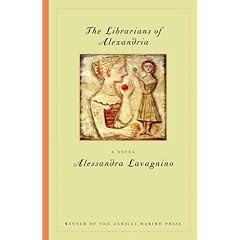The Librarians of Alexandria

by Alessandra Lavagnino
Is it too late to add a New Year's resolution? I really have to work at picking up more fiction -- I want to resolve to read a novel a month. So here's one for August. I don't know what it is with me and fiction -- I didn't even really start this one until it was almost due back at the library. So I had to renew it when I was about two-thirds of the way through it.
The girl that renewed it for me asked me what I thought about it. I was having a hard time getting into it. Usually I reach a point by 50 or 75 pages in where the story starts to pull me along, but with this one I was about 150 pages in before it stopped feeling like work.
She agreed that it did feel like work to read -- for her it was because it kept jumping from family to family and by the time a character reappeared it was hard to pick up the thread again.
I had to admit with some embarrassment that I was having trouble keeping the names straight -- it was like reading Russian literature or something, I had to really work at figuring out who we were talking about. Didn't think I'd have that problem with Italian names.
I picked this one up because I'd heard that the author really captures a sense of place well, bringing it to life with her details. And indeed, the setting were beautiful, but I can't really vouch for how well she captured them, because I've never been to Alexandria, or Rome, or Palermo.
So that's where things stood when I renewed it -- then I turned the corner into where she isn't jumping from family to family, but ties them all together around one broken marriage, viewed through the eyes of the couple's 10-year-old daughter. And again, she uses layers and layers of detail to capture a character and her reactions this time rather than the setting. And this is a place I have been to, so I can say it's uncanny how real it is on the page.
Everything this girl thinks, all her responses and actions, they're all true. I remember it being exactly that way. That sense of no longer being your authentic self, because you are forced to constantly play a role based on what's expected of you or what those close to you want to hear. All the people and places familiar to you are still there, but forever changed by what's happened -- they're given back to you broken. How this all makes you a different person than you were before.
I don't know how she wrote this. I didn't remember it until I read it -- I can't take myself back to my 10-year-old self. How did she do it?
Not easy to read, the last part, but I couldn't stop. Ugh. Now I feel like I've been on a therapist's couch for the two days it took me to finish the book.
One final note -- the thing that interests me most about the author is that she was "a biologist and professor of parasitology at the University of Palermo until her retirement, she is also the author of more than 50 papers on tropical diseases." Cool!

